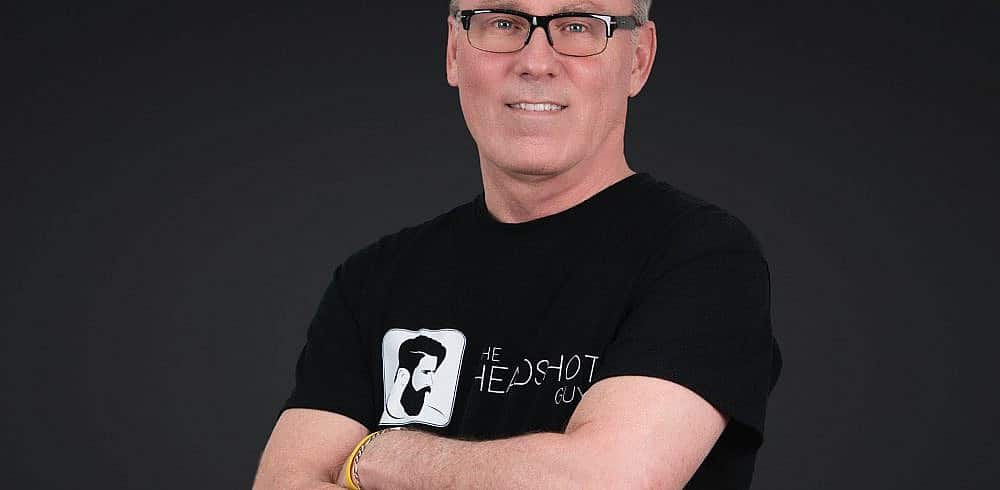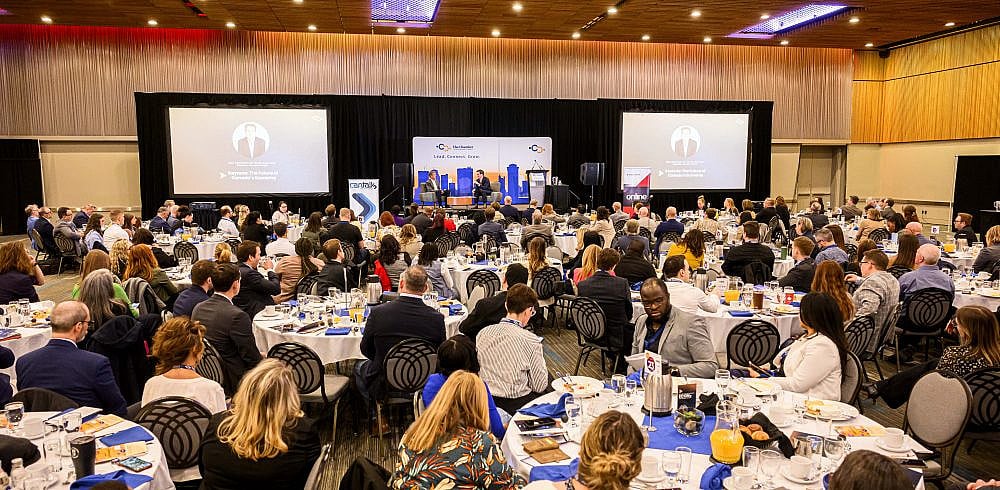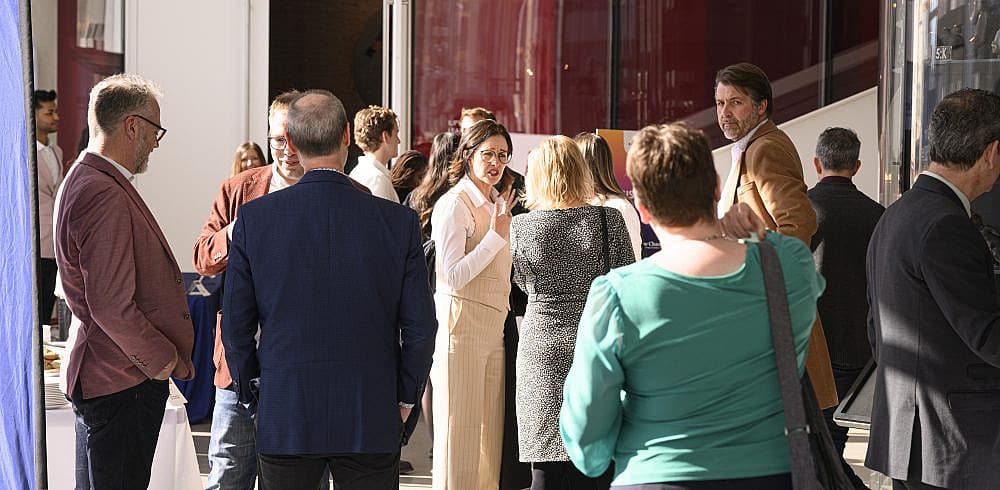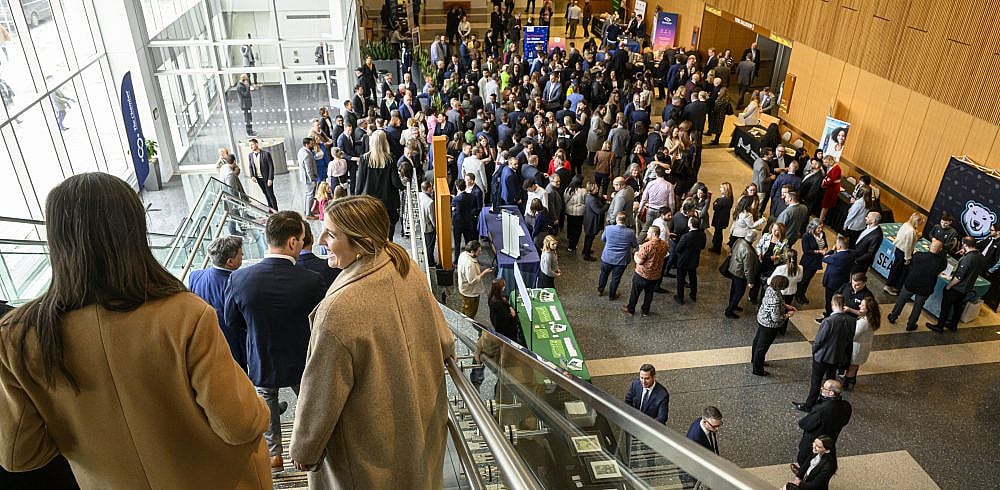By Noah Cote, Communications Manager, The Winnipeg Chamber of Commerce
Updated Friday, February 14, 2025
Ahead of our upcoming Member Luncheon, “The Power of Canadian Entrepreneurs” with Pitch Better Co-founder Amoye Henry, we sat down with Amoye to talk about the ways businesses can support women entrepreneurs, her evolution in her role with Pitch Better, and what audience members should expect to take away from her keynote.
Noah Cote: Can you tell us a little about yourself and your organization?
Amoye Henry: Certainly. My name is Amoye Henry, and I am the co-founder of Pitch Better Inc., a nonprofit dedicated to supporting the next generation of entrepreneurs. I also serve as a general partner at Founders Innovation Labs, a $10 million pan-Canadian accelerator and fund that invests in founders within the green and digital technology sectors. Beyond my professional endeavors, I am also a mother and an avid traveler.
NC: What do you see as the biggest challenges facing Black women and equity-seeking entrepreneurs today?
AH: The most significant challenges are limited access, insufficient funding, and a lack of awareness. These barriers often hinder the ability of Black women and equity-seeking entrepreneurs to scale their businesses and achieve long-term success.
NC: What do you see as the biggest opportunities for advancing female entrepreneurship in Canada, and how can the business community help bridge that gap?
AH: The most impactful action businesses can take is to consistently support women-owned enterprises. This means integrating them into procurement chains, offering multi-year contracts, and ensuring that these efforts extend beyond symbolic gestures during events like Black History Month or Women’s History Month.
Organizations should embed supplier diversity into their corporate strategies, allocating 10 to 15 per cent of their revenue toward underrepresented communities. Economic empowerment is cyclical—when these communities thrive, they reinvest in each other, fostering sustainable ecosystems and reducing reliance on public support systems.
NC: Can you share a moment in your role with Pitch Better when it really hit you on a personal level that what you are doing is working?
AH: There have been many moments, but one that stands out is our recent Demo Day in New York. Seeing investors approach us, acknowledging the transformative impact of our program and recognizing the investment potential of these businesses, was incredibly validating.
For years, we’ve been advocating for the investment community to recognize the value of diverse entrepreneurs. Now, we’re not just bridging the gap—we’ve become a conduit for high-potential deals.
That shift from theory to tangible results has been deeply rewarding.
NC: How does it feel to receive that kind of feedback?
AH: It’s an incredible feeling, but it also reinforces the immense amount of work that remains ahead. While I’m grateful and optimistic, I’m also keenly aware of the ongoing challenges.
The rollback of diversity, equity, and inclusion (DEI) initiatives is particularly concerning. Programs are being defunded, such as the Indigenous program at Shopify, which is disheartening. We made substantial progress, yet we’re now witnessing setbacks. This only strengthens my resolve to continue pushing forward—because, at the end of the day, data speaks for itself.
NC: And for anyone interested in the data, they can find your pioneering studies and impact reports on your website. But there is that pullback on all the DEI programming that’s happening with our neighbors to the south. What do you make of that right now?
AH: The reality is complex. From a social perspective, underrepresented and immigrant communities often suffer when leadership does not prioritize equity. However, from a purely capitalist standpoint, certain policies may benefit high-net-worth individuals.
I’ve had conversations with entrepreneurs who generate seven or eight figures in annual revenue, and some argue that certain policies work in their favour—even when they negatively impact others. This fragmentation creates a divided business culture.
For Canada, the ripple effects of U.S. policies are significant, as we are deeply intertwined economically. Canadians must build resilience by diversifying trade relationships and fostering homegrown innovation to reduce over-reliance on the American market.
Balancing advocacy for marginalized entrepreneurs while engaging with high-net-worth individuals is a nuanced challenge—one that requires both strategic foresight and empathetic leadership.
NC: Building a business is as much about personal growth as it is about professional success. How would you say you’ve evolved since Pitch Better’s inception in 2019, and what daily routines have helped you succeed?
AH: Personal growth is inextricably linked to a strong foundation in mental, physical, and spiritual well-being. When you are aligned in these areas, you operate at your highest level professionally and economically.
Over the years, I have integrated structured habits into my life—regular exercise, hydration, and surrounding myself with mentors and advisors. I also study individuals who embody the success I aspire to achieve and model key aspects of their habits.
For instance, the concept of having seven revenue streams resonates with me. I am currently at four and continuously strategizing on how to expand.
Lifelong learning is also critical. Whether through reading, research, or travel, immersing myself in different cultures and environments has been transformative. Exposure to diverse perspectives has deepened my commitment to empathetic leadership, reinforcing the idea that while experiences differ, all are equally valid.
I’ve also become more strategic. In the early days, my approach was more reactionary — responding to challenges as they arose. Now, I prioritize long-term planning and sustainable solutions. Business, like life, requires both vision and agility.
NC: What can our membership expect from you at the February luncheon, and what do you hope they take away from this event?
AH: I hope attendees leave with a deeper appreciation for the evolving landscape of entrepreneurship. The face of business is changing, and embracing this evolution is key to economic progress.
Tolerance, inclusion, and investment in diverse entrepreneurs are not just moral imperatives—they are strategic business decisions. I encourage everyone to actively engage, support, and open their minds, networks, and capital to emerging leaders.
Because at the end of the day, if we all work together, we all win.
See some of the highlights from yesterday’s event on our Instagram.




